Your Planets
Portraits of the Planets
Aspects between Planets
The planetary ages
The planetary families
Planets in Signs
The Planets in comics
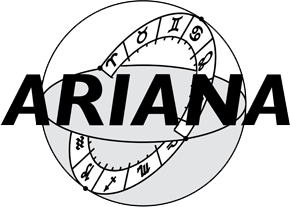

“Kepler (Johannes), German astronomer (Weil der Stadt, Württemberg, 1571 — Regensburg, 1630). A convinced supporter of the heliocentric system of Copernicus, he discovered the laws of the motion of the planets” (Larousse). The founder of modern astronomy, a daring precursor, was also a talented and convinced astrologer, and made no secret of it. But censorship dictionaries prefer to ignore this disturbing fact. Academic anti-astrologers even claim that he never made horoscopes just to make a living! Curious, for a man who left to posterity a diary and books where scholarly astrology is everywhere…
 Johannes Kepler was born on 17/12/1571 in Weil-der-Stadt in one of the most beautiful houses in a small village in southwestern Germany. His grandfather Sebaldus, a nobliau, was the mayor before his fortune took off and he was forced to survive by becoming a tanner. He reigns over a demented household where everyone hates, insults and watches each other. Her father Heinrich was a drunkard, a good-for-nothing womanizer, her mother Katherine, sensitive, intelligent and rebellious, the daughter of wealthy innkeepers who married her to a Kepler: dowry for title of nobility. Family and in-laws live together in filth, misery, the stench of drying skins and the incessant buzzing of big blue flies. A down-to-earth world, rustic, without tenderness and without pity.
Johannes Kepler was born on 17/12/1571 in Weil-der-Stadt in one of the most beautiful houses in a small village in southwestern Germany. His grandfather Sebaldus, a nobliau, was the mayor before his fortune took off and he was forced to survive by becoming a tanner. He reigns over a demented household where everyone hates, insults and watches each other. Her father Heinrich was a drunkard, a good-for-nothing womanizer, her mother Katherine, sensitive, intelligent and rebellious, the daughter of wealthy innkeepers who married her to a Kepler: dowry for title of nobility. Family and in-laws live together in filth, misery, the stench of drying skins and the incessant buzzing of big blue flies. A down-to-earth world, rustic, without tenderness and without pity.
The Kepler newborn is premature, a puny, nearsighted and ugly little being. As a child, his poor eyesight made him clumsy and clumsy. Solitary and dreamy, he does everything possible to preserve his tranquility. Dirty, scabby, covered with sores and boils, it is thanks to his passion for games of knucklebones and dice that he learns to count very early on. Wild, he endures blows and cries in silence, flees his family and only finds rest in nature and the contemplation of the sky. The rest of the time, he takes care of the pigsty while dreaming of celestial harmonies, myopic mystic in a world of brutes where he is constantly called ugly, incapable, “dog and son of dog”…
At the school of Protestant pastors, despite his short-sightedness and his indiscipline, his character withdrawn, moody and unpredictable, he manages rather well: at ten years old, he can read, write and speak German and Latin. He is ready for all shenanigans to obtain books, these fabulous objects which open the doors of knowledge. But he seems doomed to remain a farmhand, assistant cooper or handyman, until the day when fate decides otherwise: one of his former schoolmasters, having noticed the sparkling intelligence of the young Johannes, decides to recommend it to the dukes of Würtemberg, who offered scholarships to poor and deserving young Protestants.
 His candidacy was accepted and he entered the minor seminary. He throws himself into studies with passion and voracity and, catching up at a staggering speed his academic delays, quickly becomes the first of the class… Later, at the major seminary, the mysteries of the math, astronomy, theology and philosophy fascinate him. He hears there about a certain Copernicus, who would claim that the Earth is not at the center of the world and that the planets revolve around the Sun. Immediately seduced by this surprising and disturbing idea, he had the chance to meet, in Tübingen, a professor who had a copy of the book From the revolution of the celestial orbs, in which Canon Copernicus argued in favor of heliocentrism. As soon as he finished reading, a vocation was born: he would be an astronomer. During the same period, he begins to write his diary in which he continues to analyze and comment on… his birth chart: he will also be an astrologer…
His candidacy was accepted and he entered the minor seminary. He throws himself into studies with passion and voracity and, catching up at a staggering speed his academic delays, quickly becomes the first of the class… Later, at the major seminary, the mysteries of the math, astronomy, theology and philosophy fascinate him. He hears there about a certain Copernicus, who would claim that the Earth is not at the center of the world and that the planets revolve around the Sun. Immediately seduced by this surprising and disturbing idea, he had the chance to meet, in Tübingen, a professor who had a copy of the book From the revolution of the celestial orbs, in which Canon Copernicus argued in favor of heliocentrism. As soon as he finished reading, a vocation was born: he would be an astronomer. During the same period, he begins to write his diary in which he continues to analyze and comment on… his birth chart: he will also be an astrologer…
In fact, he is appointed professor of mathematics. He is a deplorable teacher: confused, stammering, without authority. He prefers studious and solitary research. Attracted by geometry and the theories of Pythagoras, he dreamed of being able to explain the distribution of planetary orbits inside simple polyhedra… a chimera that would later lead him to upset astronomy. He is still so poor. To put butter in the spinach and have his work published, he agrees to monetize horoscopes and to write forecasts astrology in the almanacs. He who has such a high and demanding opinion of astrology (his diary proves it) is disgusted himself to give in to these mercantile practices. He spends his nights doing learned calculations and writing his first book, the Mysterium cosmographicum (The secret of the world).
One day, Kepler receives a letter from Tycho Brahe. Son of a wealthy family, renowned alchemist, astronomer and astrologer, great traveler, tireless inventor, builder of optical instruments and relentless observer of the sky, Tycho Brahé wore a nose of gold and silver to replace that of flesh he had lost in a duel. Following the publication of De stella nova, impressive account of the appearance of a new star, King Frederick II offered him an island in Denmark so that he could build an astronomical observatory there.
Chart by Tycho Brahe, 14/12/1546 at 10:47 in Knutstorp, Denmark
Right: Ecliptic chart; left: House chart.
 No sooner said than done. The island will be called Urania (the painting opposite represents the “astronomical palace” of the Danish scholar). Tycho Brahe needs a competent assistant near him. Having read Kepler’s book, he wrote to the latter to suggest that he collaborate in his Great Astronomical-Astrological Work. Kepler agrees. From their brilliant and tumultuous collaboration will be born modern astronomy. The two men are perfectly complementary. Tycho Brahe is an extroverted, noisy giant, endowed with excellent eyesight but little turned towards abstractions; Kepler is an introverted, secretive little man, bathed in numbers but victim of his myopia. As Henriette Chardak rightly points out, “Kepler becomes the soul of Brahe, and Brahe becomes the eyes of Kepler”.
No sooner said than done. The island will be called Urania (the painting opposite represents the “astronomical palace” of the Danish scholar). Tycho Brahe needs a competent assistant near him. Having read Kepler’s book, he wrote to the latter to suggest that he collaborate in his Great Astronomical-Astrological Work. Kepler agrees. From their brilliant and tumultuous collaboration will be born modern astronomy. The two men are perfectly complementary. Tycho Brahe is an extroverted, noisy giant, endowed with excellent eyesight but little turned towards abstractions; Kepler is an introverted, secretive little man, bathed in numbers but victim of his myopia. As Henriette Chardak rightly points out, “Kepler becomes the soul of Brahe, and Brahe becomes the eyes of Kepler”.
From then on, between Urania and various European capitals, Kepler, now married and a father, will live the life of a visionary wanderer. He and Tycho will make the astronomical ephemerides more precise, will deepen the heliocentric theory of Copernicus while continuing to be passionate about astrology and making the charts of the Greats of Europe. In 1603, he formulated the first law that founded modern astrometry. This law implies that the planetary orbits are ellipses, not circles
 This is a real revolution, since for millennia, astronomers were convinced that the planets moved on perfect spheres. Kepler himself finds it difficult to admit the evidence of his discovery. It was only two years later, in 1605, that he formulated his second law, which demonstrated this accursed reality which jeopardized his own conception of a perfect cosmic geometry created by a perfect God. Finally, in 1618, he gave birth to his third law: there is a constant ratio between the square of the period of sidereal revolution of a planet and the cube of its semi-major axis.
This is a real revolution, since for millennia, astronomers were convinced that the planets moved on perfect spheres. Kepler himself finds it difficult to admit the evidence of his discovery. It was only two years later, in 1605, that he formulated his second law, which demonstrated this accursed reality which jeopardized his own conception of a perfect cosmic geometry created by a perfect God. Finally, in 1618, he gave birth to his third law: there is a constant ratio between the square of the period of sidereal revolution of a planet and the cube of its semi-major axis.
During the same years, he will continue to deepen his knowledge of astrology (he will imagine a new class of Aspects called Keplerian aspects) and to practice it, will write the first science fiction novel (a trip to the Moon)… and will tirelessly criticize the irrationalism and the stupidity of the astrologers and astronomers of his time, which did not only make him friends. After having crossed the peaks and the abysses of an incredible life, sensed the laws of gravitation, revolutionized astronomy, dusted off astrology, he died at the age of 59 on 15th November 1630 in great material poverty due to the poor sale of his Rudolphine tables and without having received the last sacraments which were refused to him by the Lutheran pastor who was in charge of them and who reproached him for not having wanted to condemn the Calvinists. He died not without having written, just before falling into the other world, the epitaph which will be engraved on his tombstone: “I measured the skies, I now measure the shadows of the Earth. The spirit was celestial, here lies the shadow of the body.”
For a modern astronomer, Kepler is something of a monster. How could a mystic, an astronomer and an astrologer cohabit inside the same man? In our time fond of binary classifications, such a character seems unthinkable. A scientist can at a pinch publicly express his religious or metaphysical concerns, but an astronomer who declares his interest in astrology would be a fatal blow to his career. Conversely, astrologers generally regard astronomers as mere technical materialists.
Contemporary astronomy is hampered by the profile of its prestigious ancestors: Galileo, Copernicus, Kepler, Tycho Brahe were interested in astrology or practiced it, and Newton was an alchemy enthusiast. It’s a bit as if a puritanical, sober and reasoning family bore the stain of a distant empire-building grandfather, but also a womanizer, alcoholic and hallucinated. In this kind of situation, hypocrisy or lies are generally the rule: since they cannot decently remove it from the family tree, the heirs shamefully disguise the memory of the ancestor. No question that he is out of place in the gallery of official family portraits.
As far as Kepler is concerned, 20th-century astronomers have found a few simple explanations to justify his sulphurous passion for astrology while preserving his reputation as the founder of modern astronomy. According to them, Kepler would have been a man cut in two, straddling magical and superstitious ancient times and rational and objective modern times. One part of him (the accursed) delighted in astrological nonsense, while the other (the ideal) was only interested in the mathematical laws of astronomy. Others go even further: they coldly affirm that Kepler only made horoscopes to earn money: the prostitute astrologer thus allowed the virtuous and impecunious astronomer to make ends meet. The mere reading of Kepler’s writings contradicts such accusations.
“That one of the founders of modern astronomy, Kepler, was also a convinced astrologer, is a sort of scandal revealed by the hesitations and euphemisms of historiography. Failing to deny the facts, we minimize their importance: we consider that it is a low task, to which the astronomer would have consented to meet his needs; almost always, a shade of regret is felt, as if it were necessary to reveal, with the secret flaw of one of the greatest princes of science, a shameful stain on the family”, writes the academic Gérard Simon.
 Mystical, Kepler was resolutely: “My mathematics will always be ready to offer pleasures quite worthy of a Christian, reliefs to their miseries, either from astronomical exercises, or from the contemplation of divine works and the harmony of the world.” In studying the laws of the cosmos, he sought to understand the divine order.
Mystical, Kepler was resolutely: “My mathematics will always be ready to offer pleasures quite worthy of a Christian, reliefs to their miseries, either from astronomical exercises, or from the contemplation of divine works and the harmony of the world.” In studying the laws of the cosmos, he sought to understand the divine order.
He openly claimed his status as an astrologer: “But if I talk about the outcome of my research, what do I find in the sky, I ask, that allows the slightest connection?… The birth chart had the one and only effect of fanning the fires of mind and judgment, to give the courage for tireless work, and to increase the desire to know; in short, it did not inspire thought or any of the aforesaid faculties, but excited them.” His approach to astrology was reasoned and above all anti-fatalistic: “How does the configuration of the sky at the time of birth determine character? It acts on man during his life like the strings that a peasant ties randomly around the squash in his field: the knots do not make the squash grow, but they determine its shape. Likewise the sky: it does not give man his habits, his history, his happiness, his children, his wealth, his wife… but it shapes his condition.”
This great astronomer’s interest in astrology pursued him throughout his life and he wrote three books devoted to this knowledge: De fundamentis astrologiæ in 1601; the Tertius interveniens in 1610 (a small treatise in which he recommended keeping astrology only the Planets and their Aspects as part of a “harmonic doctrine” and reject the zodiac he wrongly judged — without physico-astronomical foundations), and finally Astrologicus in 1620, ten years before his death in 1630.
“Even if he criticizes the credulity of his contemporaries and the arbitrariness of the astrologers of his time, observes Gérard Simon, he never questioned the validity of the possibility of making predictions from the movement of the stars. On the contrary, he endeavored to specify their theoretical foundations in several works, and in some of them, and not the least, he treats simultaneously and on a plane of equivalent dignity astronomical problems and astrological problems.” Contrary to what contemporary astronomers claim, Kepler was therefore not cut in two. The astrologer, the mystic and the astronomer lived together in his home in profound harmony.
This is an indisputable reality, an inescapable fact. The Kepler ancestor bothers his scientistic heirs: “The distance between his standards and ours, emphasizes Gérard Simon, appears here in all clarity: how can we read in Kepler exactly the opposite of what he wrote? See him delirious when he explained, be mystical when he demystified, give in to superstition when he fought it? Western reason must have undergone singular mutations so that we can no longer even represent to ourselves the conceptual relations which drove it to separate the certain from the uncertain, the believable from the unbelievable, and arrive in all rigor at the conclusions that he was defending.”
Ah! If only Kepler had been content to take an interest in astrology as a hobby original, an incongruous pastime: great scientists sometimes have little quirks that do not endanger their research “serious”, we could have discreetly placed it in this reassuring category… But that would be a huge lie (which many anti-astrologer scientists do not hesitate to utter to intoxicate public opinion).
“Kepler does not consider his astrological theories as less important or less true than those he states in optics, astronomy or cosmology: in his eyes, according to Gerard Simon, both pursue the investigation of a perfectly homogeneous field of reality, that of the mysteries of nature… It should however be specified that Kepler’s astrological conceptions are perfectly original. Because he wants to find out natural foundations predictions they authorize, he is critical not only of the predictions of his contemporaries, but of the traditional code which they followed to interpret celestial events.”
In short, unlike most of his contemporaries, Kepler wanted to base astrology on natural and rational laws. An unbearable heresy for the modern anti-astrologers who still prefer, at the limit and for the most “tolerant” of them, that astrology comes down to a symbolic and imaginary discourse. Kepler did not eat that bread: “In all cases, his approach is the same: he requires astrological operators to be compatible with a coherent physical interpretation; and when that is impossible, he denounces its arbitrariness.”
In physics as in astrology, Kepler was the first to reject the Aristotelian conception according to which nature would be made up of four basic states (hot, cold, dry, humid) giving rise to the four Elements (Fire-Earth-Air-Water): “Be that as it may, and even if I quite rightly enjoy this very ingenious imitation of nature and this distribution of qualities between Signs, I still do not attach more value to it than it deserves; and it is not because the first authors borrowed a law from nature for their arbitrary speculations, that in return the nature of celestial things submitted in everything to their speculations… It appears rather from attentive examination of the causes (denominations) that the Signs of the zodiac received the name of the elements only because of arbitrary inventions; and that in reality they are not linked by any particular relationship with the elements which served to name them.”
 Yes, it’s true, he made the charts of the greats of Europe (see opposite the Chart of General Von Wallenstein drawn by the hand of Kepler) and wrote forecasts in the popular almanacs to support his family. He was not proud of it, but he was nonetheless a genuine and rigorous astrologer. Even today, many astrologers, as authentic and rigorous as he, are also obliged to write horoscopes by the kilometer to earn a living (I know something about it: I myself have written horoscope forecast books of which I am not proud, and the money they brought me gave me the time necessary to write a book of serious astrology): as in the time of Kepler, serious astrology does not feed its man, and publishers are much more interested in the commercial benefits they can derive from a highly touted and sensationalist astrology only by promoting scholarly astrology.
Yes, it’s true, he made the charts of the greats of Europe (see opposite the Chart of General Von Wallenstein drawn by the hand of Kepler) and wrote forecasts in the popular almanacs to support his family. He was not proud of it, but he was nonetheless a genuine and rigorous astrologer. Even today, many astrologers, as authentic and rigorous as he, are also obliged to write horoscopes by the kilometer to earn a living (I know something about it: I myself have written horoscope forecast books of which I am not proud, and the money they brought me gave me the time necessary to write a book of serious astrology): as in the time of Kepler, serious astrology does not feed its man, and publishers are much more interested in the commercial benefits they can derive from a highly touted and sensationalist astrology only by promoting scholarly astrology.
Astrologer friends, Kepler is our common grandfather. Modern astrologers proudly claim his heritage, convinced like him that “Astrology is alive with him because it is a structural double of astronomy…; to deny straight away, without examination and without nuances, that it is plausible, would be to deny the validity of astronomy itself: for the possibility of understanding the world in either case comes from the same source of intelligibility, which is the word of God immanent in the world.” (G. Simon)
 Here is the astro-portrait he made of himself from the study of his own Chart at the age of 26.
Here is the astro-portrait he made of himself from the study of his own Chart at the age of 26.
“The fate under which this man was born condemns him to spend almost all his time on difficult subjects which frighten other men. In his childhood he attacked Latin versification before the age and began to make comedies. He chose the longest psalms and learned them by heart. He also wanted to learn by heart all the examples of Greek grammar from Crusius. In poetry, the acrostic, the riddle and the anagram held him back at first. Then his judgment was formed, he was able to understand for himself that all this was nothing and then became interested in the most difficult and varied lyrical forms. He wrote Pindaric verses, he also wrote dithyrambs and he chose the newest subjects: the apparent movement of the Sun, the origin of rivers, the aspect presented by the starry sky to the eyes of Atlas. He liked to pose riddles to the reader, sought out the most exquisite tips, and delighted in pursuing the allegory down to the smallest detail and pulling it by the hair. When he imitated other poets, he amused himself by taking up their expressions textually to give them a new meaning in relation to his subject. He wrote essays in which he developed paradoxes: French should be learned rather than Greek, universities are the death of Germany. When he criticized an opponent’s theory, he advanced no argument of which he was not himself convinced; when he did research, he always knew how to bring to light something that was not found with the authors.
He loved mathematics more than any other intellectual activity. In philosophy he read Aristotle in the text and wrote research on the Physical of this author, but almost completely left out his Moral. Logically he neglected the Topicals and go directly to Analytical Seconds, where the interpretation of Planerus seemed attractive to him; but, on Physics, what has written Scaliger left him skeptical. He was especially interested in the book of Meteora and subjected it to methodical criticism. In theology, from the outset and from the outset he attacked the problem of predestination and first sided with the party of Luther on the issue of free will. What is admirable is that he was only thirteen years old when he appeared before the University of Tübingen with a thesis on predestination; during the discussion, someone laughed at him: ‘So, virgin, predestination works on you too?’ But later he sent Luther and his theory packing and reading Huss regained his health. It was immediately to mingle with other discussions on Calvinism, where he threw himself into full battle: would the divine personality be so made that its nature would remain unknowable to us?
As for the words of the Last Supper: “This is my body, this is my blood”, he interpreted them by supposing that this expression covered a Hebrew way of speaking; another time he maintained that before Christ mankind had been ignorant of the Resurrection. What led him to these ideas were either party arguments or the obscurities of Holy Scripture. He also felt that the pagans were not necessarily doomed to damnation, given the mercy of God. In Astrology he found many things which he believed to be new, but he realized later that they had already been discovered. He made a celestial sphere according to the new theory, especially for the five planets, which is something very difficult. In History he gave a new interpretation of the Septaines of the Book of Daniel, wrote a new history of the Assyrians and researched the Roman calendar. He subjected everything he studied to systematic criticism and made files of everything. He also kept the smallest notes he had taken and was careful not to get rid of any of the books offered to him, thinking that they could all be useful to him one day. He did not like wasting his time, even for a moment, and avoided companies, however regretful he might be. He was not too fussy about money matters, kept his household tight and cut short the thousand little things that waste time. With that, he hated work and only the desire for gain kept him at his task. Yet he found that whatever he pursued was of a high order and he almost always reached the truth.
Mercury in House VII signifies haste and distaste for work, since he himself is in motion; the Sun in sextile with Saturn means care and tenacity. Our man carries with him this contradiction: he constantly regrets the time he loses and keeps losing it through his own fault. Mercury gives him the love of jokes, games, amusements that serve as intellectual recreation. In fact, when he was little, he loved gambling. Growing up he became interested in other things and it was therefore to these other things, as we can see, that he devoted himself; and as his parsimonious character diverts him from games of chance, he often plays by himself. Please note that this parsimony is not a desire to accumulate, but a fear of poverty. It is true that all avarice must likewise be a preventive anguish. No, however, in many men there is the love of money for itself, whereas our man has in view the use he will make of this money and respectability. Perhaps this should be attributed to the shame he would have of being poor. Because he is haughty, he despises the judgments of the vulgar, he would easily be harsh enough. Whether Mercury is in aspect with Mars as it is, Mars terrifies him ; then the mind becomes too quick, inclined to anger, to gambling, to distractions, to having fusses, quarrels, to commit sins, to let nothing stop it, to meddle in everything: there is everything this in our native. Also inclined to contradict, to argue, to lecture everyone regardless of rank, to criticize everything. Because, remarkably, our native behaves in society as in his work: he attacks, insults, tears through everyone…
 Even when it succeeds, a ruse catches up with its author around the bend. There are, however, people whose tricks work so well that they seem bound to deceive God and all mankind; in the end, at the very end, these tricks fall through, of course, but all the same the fact that the imposture could have held on for so long was something.
Even when it succeeds, a ruse catches up with its author around the bend. There are, however, people whose tricks work so well that they seem bound to deceive God and all mankind; in the end, at the very end, these tricks fall through, of course, but all the same the fact that the imposture could have held on for so long was something.
So here is my conclusion: Mercury in quadrature with Mars, moving rapidly on the eastern horizon, denotes cunning; as it is in the 7th house, this trick is happy, that is to say full of circumspection: the native does not have the misfortune to be one of those (so many alas) who, when they weave a plot, forget a detail that causes any the case. Unfortunately he lacks, firstly, continuity in ideas, because of his rapidity of mind; secondly, things being what they are, they cannot always be successful, because they go badly because of the squaring of Mars; third, the Moon in House XII indicates that this trick is bad for men and that everything else is no better. This man, until his twenty-sixth year, when I write this, hardly listened to the voice of reason, especially in his youth. Besides, he was dealing with far too many things at once. Finally, there are certain truths that he had not been able to understand. These three reasons cause him to constantly regret his past conduct.
Let’s look at the last point first. It is natural that young people are unaware of many truths and their horoscope has nothing to do with it. If he undertook many things and finished nothing, it is primarily for two natural causes. He only has outbursts of zeal that don’t last because he works a lot, but hates work a lot… The second reason why he doesn’t finish what he started is the whim of Fortune or rather nature things. This delays or prevents many inventions which by nature would be feasible. His bad luck is either having to find assistants or finding them too late. This brings us back to another problem: why can’t this man do anything by himself (which would be lucky for him) and must he always go through others?
The nature of this man is in all respects similar to that of a dog. From a domestic dog. I) Physically, he is lean, well-proportioned, agile. He always eats the same thing, he loves to gnaw on bones or old croutons, he is voracious, eats the dishes without any order, as they come to hand. He drinks little. He is content with the coarsest cuisine. 2) His ways of being are of the same kind. He sneaks up on his superiors like the dog of the house, he is perpetually dependent on others, and he does not get angry if he is reprimanded but does everything to return to favor, both in science and in politics. or household, he lends himself to all tasks, including the lowest. He is constantly on the move, he attaches himself to all those who have something to do and he does like them. He does not support conversations and receives people who come to visit like a dog. If the slightest thing is taken from him, he growls and becomes furious like a dog. He is stubborn. He pursues with reproaches, let us say with his barking, anyone who misbehaves. He bites too, he has a biting repartee. Most people hate and avoid him, but his superiors like him, like the folks in the house like a good dog. He abhors baths, lotions and frictions, like dogs. His temerity knows no bounds, for he has Mars in quadrature with Mercury and in trine with the moon. But he still cares about his skin and living dangerously is not his forte, probably because his aspects of Mars do not relate to the Sun.
I have done with his temerity, his insolence, his bad character, his greed, with all the faults which are generally reproached to him. Let us now come to the qualities which earned him some esteem, such as honesty, piety, loyalty, politeness, distinction. We will see, finally, some mixtures of faults and qualities, such as his curiosity and the passion he has quite unnecessarily for great things. When he was little, his masters praised his happy character, although he was worse brought up than all his comrades. Now that he is grown up, he passes for pious, quiet, hardworking, which earns him the esteem of honest people. But what people think of him is an element of his Fortune rather than his character and we will explore that further with this one. Going back to his character, he is indeed pious to the point of bigotry. When he was ten years old, the first time he read Sacred Scripture, he set himself the example of Jacob and Rebecca for his future marriage and wanted to put into practice the precepts of the Law; he lamented that, as he already knew impurity, the gift of prophecy was forever denied him. One day when he had committed a mortal sin, he fixed his own penance and, having done it scrupulously, he considered that his sin was forgiven him. This penance was to learn some Latin speeches by heart. If sleep overtook him before he could say his evening prayers, he added them to his morning prayers. He began to ask God for a happy and glorious destiny, so that this temporal help might be a sign which enabled him to believe in his salvation. He likes to talk about religion in society. He spontaneously cultivates virtue, and there is no big stain in his life; at most he indulges, even today, in anger or inconsiderate jokes. He loves and respects old people, he practices recognition in words and actions and puts some ostentation into it. He has a taste for tolerance, in the sense that he carefully weighs the reasons of others; for, when he cannot approve of them, he is the first to strike. Being tolerant, he cannot believe that God himself will purely and simply damn the nations that do not believe in Christ; also he preaches peace between Lutherans and Calvinists, does he show fairness to papists and advises everyone to do the same.
All this flows from one and the same origin, rectitude of judgment; whoever has it loves God and his neighbour. And yet, strangely enough, a certain weakness of character undermines everything he wants to do.”
The exact time of birth is controversial. There are no Civil Registry documents since this service did not exist in Germany at the time. Official parish natal data was otherwise unreliable except for members of the nobility and upper social classes, and Kepler was of commoner ancestry. The only sources therefore come from Kepler himself, who gives two main versions of his natal time: either 01:00, or 02:37.
 The minute accuracy of the 02:37 version is alarming. It is explained by the fact that at that time, it was quite common among astrologers to proceed to the rectification of the hour of birth using a process called Trutine of Hermes. The Trutine of Hermes (the trutina was a Roman scale used for heavy weighing and this Hermès is none other than Hermes Trismegistus, a mythical character from Greco-Roman antiquity made famous by the Emerald Table attributed to him and his cult phrase “What is below is like what is above, and what is above is like what is below”) was based on the assumption that there would be a connection between the Natal Chart and the Conception Chart, the position of the natal Moon representing the exact degree of the Ascendant-Descendant axis of the conception chart, while the Ascendant of the natal chart would correspond to the exact degree of the Moon of conception, the day of conception being located in a time range of more or less 15 days around the 273rd day before birth, i.e. approximately the 9 months of gestation.
The minute accuracy of the 02:37 version is alarming. It is explained by the fact that at that time, it was quite common among astrologers to proceed to the rectification of the hour of birth using a process called Trutine of Hermes. The Trutine of Hermes (the trutina was a Roman scale used for heavy weighing and this Hermès is none other than Hermes Trismegistus, a mythical character from Greco-Roman antiquity made famous by the Emerald Table attributed to him and his cult phrase “What is below is like what is above, and what is above is like what is below”) was based on the assumption that there would be a connection between the Natal Chart and the Conception Chart, the position of the natal Moon representing the exact degree of the Ascendant-Descendant axis of the conception chart, while the Ascendant of the natal chart would correspond to the exact degree of the Moon of conception, the day of conception being located in a time range of more or less 15 days around the 273rd day before birth, i.e. approximately the 9 months of gestation.
 It seems that Kepler corrected his natal time according to this fuzzy, uncertain and very questionable process, and that the variations around 02:30 are the result of his calculations found in his archives, according to which he would have been conceived at 4:37 on 16th May 1571 and that her gestation would have lasted 224 days, 9 hours and 53 minutes (admire the precision!). This figure is of course neither serious nor credible: it is impossible, even at the beginning of the 21st century, to determine with such accuracy the hour of conception. Indeed, for there to be fertilization, at least one sperm must be present in the fallopian tube at the time of ovulation. However, after ejaculation, sperm can survive in the woman’s body for up to two to three days, and the time during which a woman can be fertilized is thus estimated at around four days. In short, the Trutine of Hermes does not weigh, we can even say that it is great nonsense, which does not prevent many postmodern software from offering it anyway as a gadget very best For correct birth time.
It seems that Kepler corrected his natal time according to this fuzzy, uncertain and very questionable process, and that the variations around 02:30 are the result of his calculations found in his archives, according to which he would have been conceived at 4:37 on 16th May 1571 and that her gestation would have lasted 224 days, 9 hours and 53 minutes (admire the precision!). This figure is of course neither serious nor credible: it is impossible, even at the beginning of the 21st century, to determine with such accuracy the hour of conception. Indeed, for there to be fertilization, at least one sperm must be present in the fallopian tube at the time of ovulation. However, after ejaculation, sperm can survive in the woman’s body for up to two to three days, and the time during which a woman can be fertilized is thus estimated at around four days. In short, the Trutine of Hermes does not weigh, we can even say that it is great nonsense, which does not prevent many postmodern software from offering it anyway as a gadget very best For correct birth time.
 If we refer to his favorite variant of natal time corrected by the care of the Trutine of Hermes (02:37 therefore), he would have been born at the rising of Neptune and the Moon in Gemini in House XII and at the setting of Mercury in House VII, which would be confirmed by the analysis of his own Birth Chart which appears above and the fact that he wrote that he was born when “the 25th degree of Gemini was rising and the 22nd degree of Aquarius culminated”, analysis whose astrological mentions correspond well to the orientation of the sky for 02:37. When Kepler lived, the planets Uranus, Neptune and Pluto had not yet been discovered. He therefore could not know that he was thus placing himself under a dominant neptunian (Neptune rose almost exactly at the Ascendant in Gemini). This takes nothing away from the fact that this astronomer of Larousse officials found nothing better than astrology to make his self-portrait.
If we refer to his favorite variant of natal time corrected by the care of the Trutine of Hermes (02:37 therefore), he would have been born at the rising of Neptune and the Moon in Gemini in House XII and at the setting of Mercury in House VII, which would be confirmed by the analysis of his own Birth Chart which appears above and the fact that he wrote that he was born when “the 25th degree of Gemini was rising and the 22nd degree of Aquarius culminated”, analysis whose astrological mentions correspond well to the orientation of the sky for 02:37. When Kepler lived, the planets Uranus, Neptune and Pluto had not yet been discovered. He therefore could not know that he was thus placing himself under a dominant neptunian (Neptune rose almost exactly at the Ascendant in Gemini). This takes nothing away from the fact that this astronomer of Larousse officials found nothing better than astrology to make his self-portrait.
But all is not so simple. The version of the natal time around 1:00 is also attested by a horoscope drawn by Kepler’s own hand (see its reproduction above). This time, the Ascendant is at the very end of Taurus, the Moon is about to rise in House I, Pluto having a very strong ecliptic latitude is in the zone of its rising in House XII and Venus culminates in House IX. This version is in total contradiction with the one that was the reference for Kepler’s astrological self-portrait.

Uncertainty therefore remains. Which version is closest to reality? The one at 01:00 or the one at 02:30? We will never know for sure. In both cases, the Moon is dominant, adjoined either to Neptune (for 02:30), or to Pluto (for 01:00). For 01:00, Saturn is angular at DS and therefore dominant, while for 02:30 it is the least valued planet. Kepler’s self-analysis for 02:30 was also distorted by the fact that he was unaware of the existence of the trans-saturnian planets, which had not yet been discovered when he undertook this exercise. Why did he choose to deprive himself of a saturnian dominant according to the version of 01:00? In order not to comfort the astrologers of his time who swore only by Planetary rulerships, whereas according to this system Saturn is the Ruler of Capricorn, Kepler’s Sun Sign? Mystery… And then why wouldn’t he have stumbled upon his true time of birth by using this irrational and unrealistic Trutine from Hermès to correct it? Not impossible for this great intuitive, and it would not be the first time in the history of science that the serendipity does wonders! After all, Kepler discovered the fundamental laws of planetary motions of our solar system by wandering into improbable polyhedral considerations.
Note in passing that the natal coordinates of Ptolemy, illustrious astronomer-astrologer predecessor of Kepler, are totally unknown, which is a shame… Still, we can thus make two different interpretations of Kepler’s Chart depending on the time to which we refer. I chose 02:37 in a purely arbitrary way and because the Chart to which this hour corresponds agrees quite well with Kepler’s self-astro-portrait, but you may very well prefer the other hypothesis.
Born on 17/12/1571 at 14:37 OT (14:01 UT) in Weil-der-Stadt.
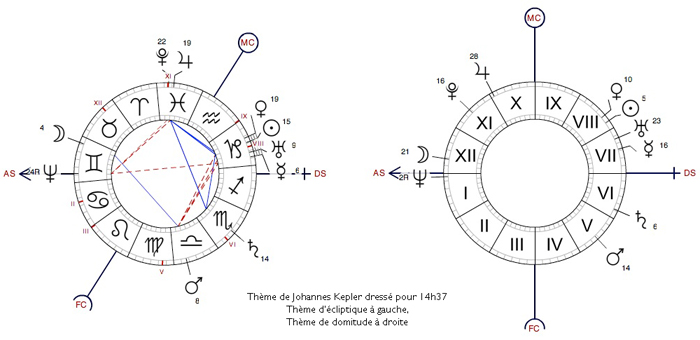
Moon-Neptune/Gemini: Moon and Neptune, his first two planetary dominants, make Kepler intuitive, inspired with a vast imagination (Neptune) in search of harmony and plenitude (Moon), very widely open to the outside world and its thousand facets (Gemini).
Sun-Mercury-Uranus/Capricorn: the conjunction Mercury-Uranus, also dominant, gives it a lively curiosity, a playful temperament (Mercury) as well as a very great rigor (Uranus), all at the service of a quest for essential structures (Capricorn).
Opposition Neptune-Mercury: the visionary mystic (Neptune) does not always mix well with the facetious joker (Mercury). When Neptune dominates, the perception of the invisible makes it difficult to relax. Immersed in his deep feelings for the mysteries of the cosmos, Kepler finds it difficult to take things lightly… When Mercury dominates, he evacuates with a mischievous pirouette his states of mind and his metaphysical concerns, plays dice to distract himself from divine mysteries. Open to all possibilities, to all hypotheses, he is wary of his intuitions…
Capricorn-Gemini: these two Solstice Signs incite Kepler to search for vast syntheses which allow to go beyond the usual oppositions. Capricorn and Gemini, it is day and night: the night duration is decreasing and dominant in Capricorn, while in Gemini, it is the increase in the diurnal duration which predominates. Kepler is therefore both riveted on an absolute that isolates him from the rest of the world (Capricorn) and totally permeable to the outside universe (Gemini). Hence an alternation between attitudes of gruff refusal (Capricorn) and epidermal excitement (Gemini), between the temptation to withdraw into oneself and that of openness in all directions.
Mars trine Moon, square Mercury-Uranus: with Mars trine Moon, Kepler perceives reality as a pre-established (Moon) dynamic and living (Mars) harmony. Under the dissonance Mars-Mercury-Uranus, any attempt at communication (Mercury) quickly tends to lead to violent confrontations (Mars) in a demanding and tense cerebral context (Uranus). There is also a constant and trying back and forth between hypotheses (Mercury), theories (Uranus) and facts (Mars)
Saturn in last position: those who believe in “planetary masters” will be surprised that Kepler, with its four planets in Capricorn, is not saturnian. But first, Kepler had dismissed the masteries: “But there is nothing more shameful than the almost unique concern of certain Astrologers, he writes, to distribute twelve domiciles among the seven planets by a kind of childish credulity ignoring all solid and philosophical reason, and to fabricate dominations, momentary upheavals of empires, as if it were a question of a human society: this is the origin of all Magical and Astrological superstition.” Then, just read his astrological self-analysis: Kepler does not describe himself as a Saturnian, but as a being who wastes his time by dint of incongruous ramblings, strange daydreams and taste for play, all behaviors that do not have anything saturnian… and everything of a clearly dominant Moon-Neptune-Mercury.
Initial version of the article published in No. 4 of Astrologie naturelle (December 1998), amended October 2015.
▶ Kepler astronome astrologue, Gérard Simon, Collection Library of Human Sciences, Gallimard.
▶ Kepler, le chien des étoiles, Henriette Chardak, Librairie Séguin.
▶ The world according to Claudius Ptolemy, astronomer-astrologer and lighthouse of Alexandria

Les significations planétaires
par
620 pages. Illustrations en couleur.
La décision de ne traiter dans ce livre que des significations planétaires ne repose pas sur une sous-estimation du rôle des Signes du zodiaque et des Maisons. Le traditionnel trio Planètes-Zodiaque-Maisons est en effet l’expression d’une structure qui classe ces trois plans selon leur ordre de préséance et dans ce triptyque hiérarchisé, les Planètes occupent le premier rang.
La première partie de ce livre rassemble donc, sous une forme abondamment illustrée de schémas pédagogiques et tableaux explicatifs, une édition originale revue, augmentée et actualisée des textes consacrés aux significations planétaires telles qu’elles ont été définies par l’astrologie conditionaliste et une présentation détaillée des méthodes de hiérarchisation planétaire et d’interprétation accompagnées de nombreux exemples concrets illustrés par des Thèmes de célébrités.
La deuxième partie est consacrée, d’une part à une présentation critique des fondements traditionnels des significations planétaires, d’autre part à une présentation des rapports entre signaux et symboles, astrologie et psychologie. Enfin, la troisième partie présente brièvement les racines astrométriques des significations planétaires… et propose une voie de sortie de l’astrologie pour accéder à une plus vaste dimension noologique et spirituelle qui la prolonge et la contient.
Téléchargez-le dès maintenant dans notre boutique

Pluton planète naine : une erreur géante
par
117 pages. Illustrations en couleur.
Pluton ne fait plus partie des planètes majeures de notre système solaire : telle est la décision prise par une infime minorité d’astronomes lors de l’Assemblée Générale de l’Union Astronomique Internationale qui s’est tenue à Prague en août 2006. Elle est reléguée au rang de “planète naine”, au même titre que les nombreux astres découverts au-delà de son orbite.
Ce livre récapitule et analyse en détail le pourquoi et le comment de cette incroyable et irrationnelle décision contestée par de très nombreux astronomes de premier plan. Quelles sont les effets de cette “nanification” de Pluton sur son statut astrologique ? Faut-il remettre en question son influence et ses significations astro-psychologiques qui semblaient avérées depuis sa découverte en 1930 ? Les “plutoniens” ont-ils cessé d’exister depuis cette décision charlatanesque ? Ce livre pose également le problème des astres transplutoniens nouvellement découverts. Quel statut astrologique et quelles influences et significations précises leur accorder ?
Enfin, cet ouvrage propose une vision unitaire du système solaire qui démontre, chiffes et arguments rationnels à l’appui, que Pluton en est toujours un élément essentiel, ce qui est loin d’être le cas pour les autres astres au-delà de son orbite. Après avoir lu ce livre, vous saurez quoi répondre à ceux qui pensent avoir trouvé, avec l’exclusion de Pluton du cortège planétaire traditionnel, un nouvel argument contre l’astrologie !
Téléchargez-le dès maintenant dans notre boutique